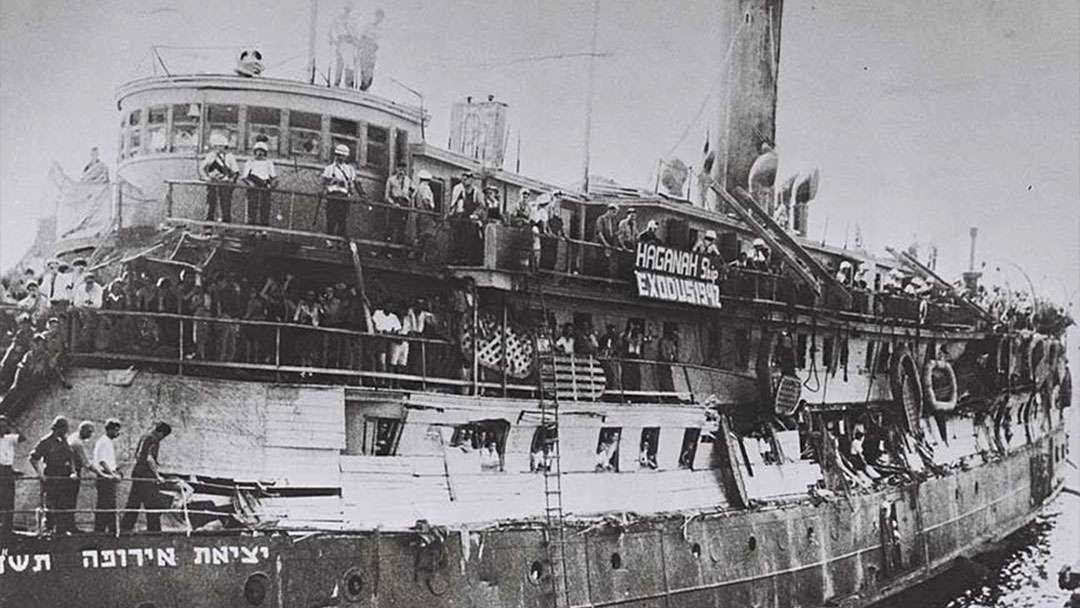The White Paper of 1939 was effectively an abrogation of the British Mandate for Palestine.
In a fierce debate in the House of Commons, Winston Churchill, who a year later became Prime Minister, vehemently opposed the White Paper. Denouncing the British government he famously said: “Now there is the breach. There is the violation of the pledge. There is the abandonment of the Balfour Declaration. There is the end of the vision, of the hope, of the dream.”¹
Appeasement Bought with Jewish Blood
It was also a death sentence for an innumerable number of Jewish people trapped in Nazi-occupied Europe.
The late Professor Shalom Lindenbaum, an Auschwitz survivor who was later imprisoned by the British in both Atlit (in Israel) and Cyprus, described the 1939 White Paper as a “political appeasement that was paid [for] with the blood of the Jewish people.” He went on to express what many Jewish people who lived through that period and survived the Holocaust felt: “By preventing Jews from escaping Europe – for them to arrive here [in Israel] and not take them in – this was real co-operation with Hitler!”²
Churchill: Jews in Palestine by Right
When he was Colonial Secretary with the responsibility of implementing the Mandate for Palestine in the early 1920s, Winston Churchill had stated emphatically that the Jews were in Palestine “as of right, and not on sufferance” (1922 White Paper).
But from the mid-1930s onwards, the British Government treated the Jews of Palestine as if they were there on sufferance, and not by right.
Records of the San Remo Conference Buried
While it is absolutely true that without Great Britain there would be no State of Israel today, the British betrayal of the Mandate, and the Jewish people in their hour of need, was not just a moral failure which the British establishment has refused to acknowledge, but a legal one too.
The British Government, and especially the Foreign Office, have gone to great lengths to cover up this failure. The official records of the San Remo Conference were buried deep in the National Archives and were only discovered in the mid-1980s by a Jewish.

Canadian lawyer, the late Howard Grief. Much of the truth of what really happened in the Mandate era has only come to light in recent decades.
The truth is that Britain violated the terms of the Mandate on almost every single level. Sadly, in the end, the Jewish nation was born in spite of Britain, rather than because of us.
The Exodus Incident
The Labour Government that followed Churchill’s electoral defeat in 1945 became politically opposed to the emergence of a Jewish state at any cost, and actively set about trying to thwart such a possibility.
The Royal Navy blockade against Holocaust survivors trying to get to their ancestral homeland—nearly all of them penniless refugees who had lost all of their family members and had nowhere else to go—is just one example. Not only was it an act of extreme cruelty that caused the drowning of some 3,000 Jewish people at sea, but it was a flagrant violation of the terms of the Mandate. The Exodus incident in 1947 exposed their plight for a horrified world to see.
As the likelihood of a Jewish state being declared increased—especially after the Exodus incident and the 1947 Partition Plan was passed by the UN General Assembly—the British Government’s policy was to keep the Jewish community in Palestine unarmed, while at the same time arming and training both the Egyptian army and the Jordanian army (the Arab Legion).
A Call to Annihilate the Jews of Palestine
The British Government did this knowing full well that the Arab League nations had declared ‘jihad’ against the emerging Jewish nation—which was nothing less than a call to annihilate the Jews of Palestine. After David Ben-Gurion’s declaration of independence, the Arab Legion attack on the newborn Jewish state was led by a serving British Army General, Sir John Bagot Glubb—otherwise known as ‘Glubb Pasha’.
Personally, I believe that it was only the hand of Almighty God that prevented another genocide of Jews just three years after the end of the Holocaust. But quite apart from the moral questions surrounding the actions of the British, there are also legal questions to consider.
Arab Invasion Illegal
After World War Two, the United Nations was formed in 1945 to replace the League of Nations. The UN Founding Charter is itself an international treaty, and any nation joining the UN commits itself to be bound by that Charter. In other words, the UN Charter itself is part of ‘international law’.
Article 2 of the UN Charter forbids the invasion of a sovereign nation and the seizure of its territory. Andrew Tucker, an international lawyer who is Director of The Hague Initiative for International Cooperation (thinc.), puts this legal perspective on Israel’s War of Independence:
There is absolutely no doubt whatsoever that the State of Israel existed as a matter of law and fact on 14th May 1948. Those Arab nations attacked a state that existed under international law. I think it’s really arguable that Great Britain was fundamentally itself in breach of the UN Charter by being involved in the attack on Israel.³
Continued British Denial of the Truth
Today in Britain, if one writes to one’s Member of Parliament—or even the Foreign Secretary—about Israel’s historic and biblical rights in Judea, Samaria and Jerusalem, the letter will be passed on to the Foreign Office. A standard reply usually comes back stating that Israelis do not have the right of domicile in any part of what the Foreign Office has regarded as ‘occupied Palestinian territory’ since the Six-Day War of 1967.
Basically, the British Government, which calls itself ‘a friend of Israel’, has turned the legal rights of Israel and the Jewish people on their head. Britain’s cover-up of its continued violations of international law, both during its conduct of the Mandate and since, has had a devastating effect on the well-being of the Jewish state, as well as prolonging the conflict between Israel and the people who are today known as ‘the Palestinians.’
I would go so far as to say that Britain’s position has actually exacerbated the suffering of the people known as the ‘Palestinians’ by its support of the tyrannical regime of its leaders. Quite simply those leaders are not interested in living in peace beside Israel. They want nothing other than the destruction of the Jewish state.
So what Relevance does the Mandate Have Today?
So, what bearing does the Mandate have on the legal rights of the Jewish people today? International lawyer Dr Cynthia Day Wallace explains: “Article 80 of the UN Charter assumes the powers given to the League of Nations, so that anything that was decided under the League of Nations, such as the San Remo Resolution, such as the Mandate of Palestine, are still legally binding under the UN Charter.”⁴
International human rights lawyer Dr Jacques Gauthier emphasises this still further: “Article 80 of the UN Charter, which is an international treaty, which is a source of rights and obligations, specifies that all of the rights given to any people prior to the execution and ratification of the UN Charter are to be protected, observed and honoured.”⁵
UN Security Council Resolution 2334
In December 2016 the United Nations Security Council passed Resolution 2334 which stated, among other things, that the Jewish presence in Judea, Samaria and the Old City of Jerusalem was “a gross violation of international law.” This resolution, which was largely drafted by the British Foreign Office, was only passed because President Obama refused to exercise the United States’ power of veto. Andrew Tucker questions the UN verdict:
“Do they have a right to enforce their will in this? No they don’t! There is no other dispute in the world that is resolved by the United Nations without the consent of the parties. The whole of the United Nations structure in international law is based on the principle of the sovereign equality of states.”⁶
Dr Wallace, a former legal advisor to the UN Secretariat in Geneva, puts another argument: “I believe that Resolution 2334 would be in breach of Article 80 of the UN Charter, if it were enforceable. But it’s not enforceable.” She goes on: “The United Nations is not a ‘legal body’—it is a political body. The UN does not have the authority to make law” (emphasis added).⁷
There are a number of other principles of international law that support Israel’s right to sovereignty over the whole of Jerusalem, Judea and Samaria, which will be examined in Part 2 of ‘Whose Land?’ when we are in a position to complete it.
In the final article of this series, we will examine the spiritual and prophetic significance of the San Remo Resolution.
References:
- Hansard, 23 May 1939.
- Interview with Professor Shalom Lindenbaum in ‘The Forsaken Promise’ (2006). Produced by Hugh Kitson for Hatikvah Film Trust.
- Quoted from an interview segment in ‘Whose Land? Pt 2’ (in production).
- Quoted from interview segments in Episode 9 of ‘Whose Land? Pt 1’, produced by Hugh Kitson.
- Ibid.
- See note 3.
- See note 3.












0 Comments